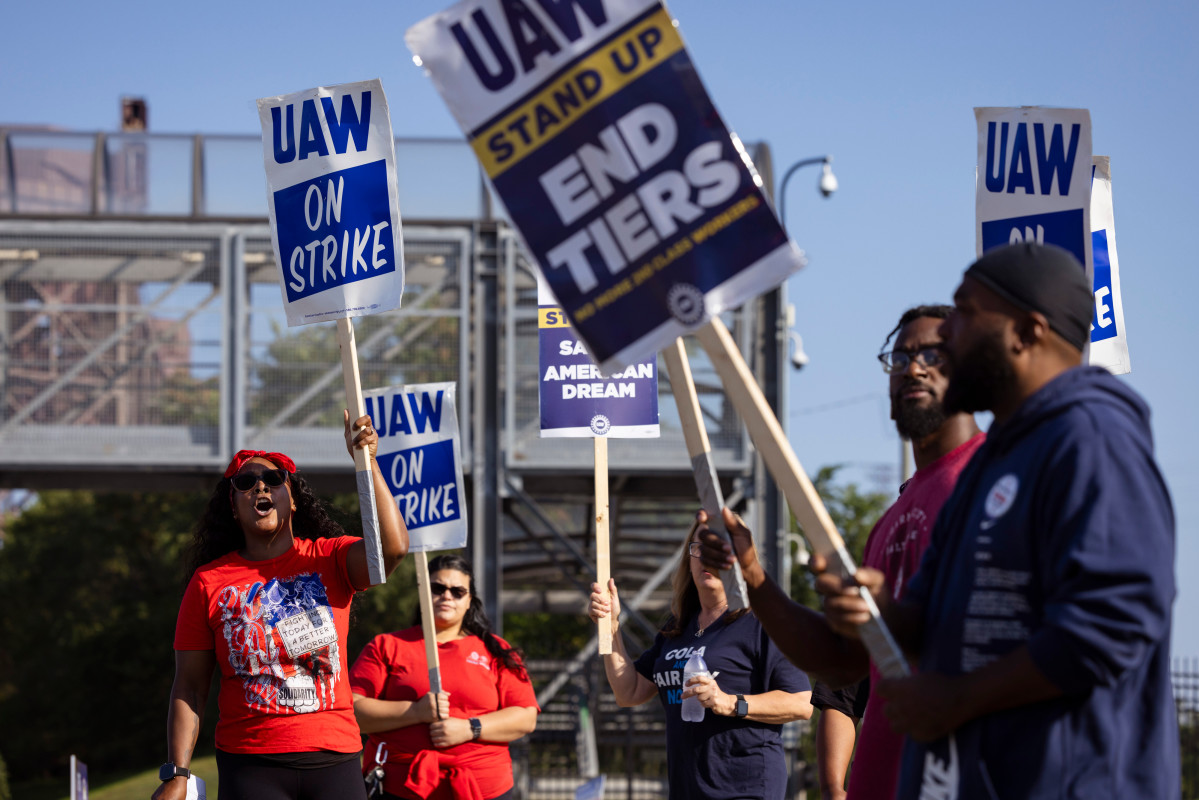
Striking United Auto Workers have a long wish list of concessions they want from Detroit's big three automakers, including higher wages, shorter work weeks, and more benefits.
So far, those demands have proven too big of an ask. Despite thousands of striking workers disrupting production at key auto manufacturing plants, a deal is yet to be struck between workers and Ford Motor Company (F) -), General Motors (GM) -), and Stellantis (STLA) -), which owns Chrysler, Dodge, and Jeep.
Ford on Oct. 4 announced bad news impacting many workers who have yet to walk the picket line. Many are likely disappointed.

Striking workers take a toll on Ford Motors
The Great Financial Crisis resulted in bankruptcy for General Motors. Ford narrowly escaped that fate thanks to loans it had taken out in 2006 and concessions from auto workers, including a decision to use company stock to finance half of its new retiree health care trust.
The U.S. auto industry has changed a lot since then. The once embattled automakers are pocketing record profits. Workers believe it's time for them to step up by offering a record contract.
Related: General Motors delivers hard-nosed message to UAW workers
The UAW's wish list includes a return to pensions for new workers that were eliminated in the Great Recession, a 32-hour workweek, and cost-of-living increases. They're also angling for pay increases of up to 40%.
Ford, General Motors, and Stellantis have said meeting those demands would put them at risk of losing out to competitors at a critical time for the industry.
Electric vehicles are quickly displacing conventional internal combustion engine vehicles. Without significant investments, the big three may struggle to catch up to EV pioneers, including Tesla (TSLA) -), the market share leader.
More Business of EVs:
- A full list of EVs and hybrids that qualify for federal tax credits
- Here’s why EV experts are flaming Joe Biden’s car policy
- The EV industry is facing an unusual new problem
EVs account for about 7% of all vehicles sold in the U.S. However, analysts believe they'll represent over one-quarter of all vehicle sales by 2026.
"Our competitors across the country and around the world, most of whom are non-union, will waste no time seizing the opportunity we would be handing them," wrote General Motors' President Mark Reuss in a recent op-ed for the Detroit Free Press.
In mid-September, Ford's Chief Executive Jim Farley claimed meeting the UAW's demands could put the car company on a path to bankruptcy, hamstringing efforts to keep pace with the likes of Honda (HMC) -), Toyota (TM) -), and others plowing big money into hybrid cars and trucks and EVs.
He isn't alone in that worry. Tesla CEO Elon Musk posted on his social media company X (formerly Twitter), that the UAW's wish list is bad news for the big three.
They want a 40% pay raise *and* a 32 hour workweek. Sure way to drive GM, Ford and Chrysler bankrupt in the fast lane.
— Elon Musk (@elonmusk) September 26, 2023
UAW President Shawn Fain takes issue with that conclusion, noting that meeting worker demands would have left Ford, GM, and Stellantis with billions in profits over the past few years. In the first half of 2023, the three automakers reported about $21 billion in profit, according to Fain.
The impasse is starting to be costly for Ford, causing it to make tough decisions impacting many workers.
Following a recent offer to UAW workers that included higher pay, a faster track to top wages, and higher contributions to worker retirement accounts, Ford announced on Oct. 4 that it would lay off employees because of disruptions caused by striking workers.
Specifically, 400 workers at its Livonia transmission plant and Sterling Heights axle plant in Michigan were given the bad news not to report to work. Including workers previously laid off, the total number of workers sidelined by Ford is above 1,300.
Ford says that its latest decision directly results from reduced production at Chicago Assembly Plant. Workers went on strike there on Sept. 29. The resulting dip in vehicle production, including the Ford Explorer and Lincoln Aviator, has reduced the need for auto parts manufactured at the two plants.
Laid-off workers won't be able to collect unemployment benefits. However, they will receive assistance from the UAW.







